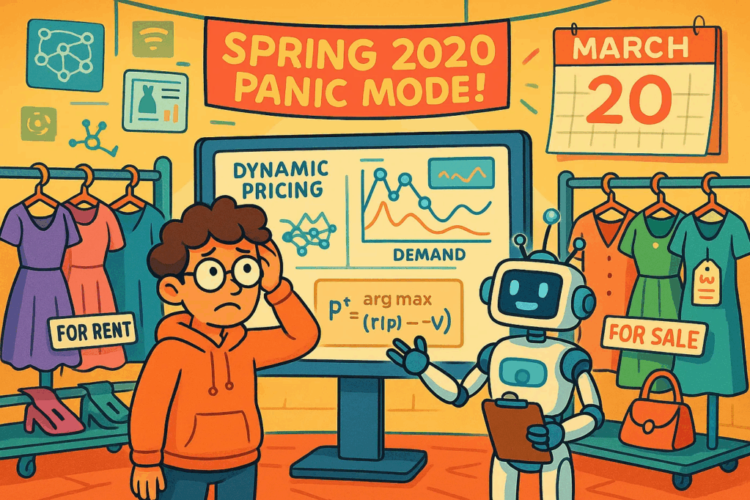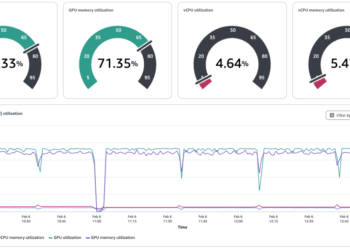of Shopify, lately instructed his staff in an inner memo: “Earlier than asking for extra headcount and assets, groups should reveal why they can’t get what they need finished utilizing AI”.
Having labored in startups for the previous 6 years, asking for extra headcount or extra assets is normally not an possibility anyhow. Constraints are tight and also you typically have to scrupulously put money into tasks you’re assured can be impactful. So in these conditions, Tobi would in all probability rephrase: “Suck it up and simply use AI in case you can”.
As a Information Scientist, I wish to perceive how our work is evolving with AI. Tech Executives are clearly anticipating each group to be extra environment friendly and extra artistic. However can a multi-billion parameter mannequin, though it has learn all the Web, be systematically useful at fixing your personal issues? To deal with this query, I’m proposing the next framework: let me undergo all of the tasks I’ve labored on because the starting of my profession and assess how a lot AI would have helped.
In the present day, we return to 2020. I’m a junior Information Scientist at an organization that has been hit fairly unhealthy by the pandemic: Lease the Runway.
What the Venture was about
Lease the Runway was launched in 2009. The corporate skilled fast development from 2016 to 2020, after introducing their hottest product: a month-to-month “limitless” subscription to style, aka “Closet within the Cloud”, permitting you to hire an enormous variety of excessive finish garments at an unbeatable worth. The product was successful for each lady eager to often put on one thing new at work, evening outs, events, particular occasions and many others. So clearly, when Covid began in March 2020, and all people stopped going out for weeks… effectively, it kinda killed the vibe.
The “Netflix of style” (sure, some individuals actually used that nickname) ended up with an insane quantity of unused stock, a whole season of things that can simply must “sit” in a warehouse, and naturally an enormous income lower. It was pressing to discover a new income stream to outlive financially. Not the best time to ask for extra assets or headcount, as a third of the workforce was furloughed.
Right here got here a superb concept: what if we had been attempting to come back again to the retail enterprise? That’s, promoting gadgets as second hand as an alternative of renting them. However right here was the large query: because the lockout goes to finish in the future and persons are going to return to renting, what gadgets ought to we hold for now vs. promote for a reduction? And how a lot ought to this low cost be?
The 2020 Resolution
The aim of the mission is to get for every product the optimum worth, that would be the proper steadiness between renting and promoting. You may get the optimum worth p as the value that can maximize the next:

Which is simple to search out… assuming you already know the future rental income (the “RentalRev” on this equation) and the worth elasticity (the chances on this equation).
In early 2020, I used to be already engaged on RTR unit economics and income forecasting. I used to be constructing a mannequin to foretell, based mostly on an merchandise rental historical past, what number of extra occasions it may very well be rented and what further income it could generate.
The lacking piece was having an concept of pricing elasticity, i.e answering the query: given a worth for an merchandise, what could be the chance of promoting it? To know extra about this mannequin, I might redirect you to this very detailed and well-written weblog article by my teammate Meghan Solari.
It is very important notice that some enterprise constraints needed to be utilized to be sure that we might not unload a whole model and hold some items for leases.
How AI may have helped
This mission is near a traditional demand and provide drawback, with the twist of the rental vs retail income that makes it a bit extra fascinating. However discovering the equation that offers the optimum worth is just not the primary problem. The predominant problem is tips on how to estimate every parameter given inadequate information.
Certainly, predicting future demand is tough: you solely have a couple of months of historical past (at greatest) for every model, and it is advisable predict a big horizon (mainly as much as finish of life). Fast adjustments in style traits require a deep understanding of the trade to be predicted, if predictable in any respect. And the uncertainty created by the early Covid interval made any time sequence fashions very onerous to construct.
Estimating pricing elasticity isn’t any simpler. As Lease the Runway was not a retail enterprise, gross sales information was by design restricted.
And that’s precisely the place the problem would come for any AI-driven answer as effectively. An AI can solely be pretty much as good as the information it’s being supplied.
Fixing for the sparse style-level information
Though every model has restricted historical past, there’s a wealth of data in comparable gadgets. This can be a prime use case for switch studying and shared embeddings that would have been made simpler by the entry to pre-trained LLMs. Shared style-level embeddings may have allowed us to make robust assumptions on new types based mostly on metadata: coloration, model, worth, cloth, silhouette… We may have extra successfully constructed fashions that learn to predict demand curves from a couple of information factors, drawing from patterns in traditionally comparable gadgets. An organization like Sew Repair has been pioneering this area by utilizing merchandise metadata to create deep embeddings that generalize throughout new stock.
Maintaining with Quick style cycle
LLMs may have made it simpler to comply with and perceive ever-changing style traits and work on exterior indicators to foretell potential shifts in all the trade. That was not one thing that was straightforward in 2020, as a result of it requires scrapping large quantities of information, discovering out what’s related and deciphering weak indicators. In the present day, that’s precisely what LLMs are good at. Corporations like Trendalytics do exactly that, scanning TikTok, Google Tendencies, and social media to floor rising patterns in silhouettes, colours, or influencers’ posts. That information would have been extraordinarily worthwhile to make an correct demand forecast.
Constructing a dynamic pricing Agent
One very last thing that would have been enjoyable to discover, given in the present day’s expertise, is to construct an agent that will have modified the costs in actual time and learnt, via reinforcement studying, the optimum pricing methods by interacting with the atmosphere. That might have allowed us to ensure the costs rely on the model’s historic and future demand but additionally on the buyer options, i.e private rental and buy historical past, engagement, style, and many others. That might have introduced us nearer to what prime RL groups at Airbnb or Uber do, repeatedly adjusting costs based mostly on actual time demand and reserving chance.
These are among the concepts that I selfishly would have been tremendous excited to work on, however notice two vital issues:
1. From a product perspective, it’s actually onerous to estimate (particularly now that I don’t have entry to the information anymore) what the impression on general income would have been.
2. These concepts may have additionally been constructed in-house again in 2020, given the good group of ML engineers we had at Lease the Runway. However it could have represented months — if not years — of analysis and growth with excessive dangers, which we couldn’t afford at the moment.
And that’s in all probability my predominant takeaway thus far on LLMs: they don’t trivialize the issues we used to bang our heads at 5 years in the past (or not but) however they make it simpler to check concepts that will have taken an unrealistically very long time to develop again within the days. This adjustments the paradigm by which Information groups sometimes function and opens new alternatives of partnership with Product groups.
Article 100% human written




